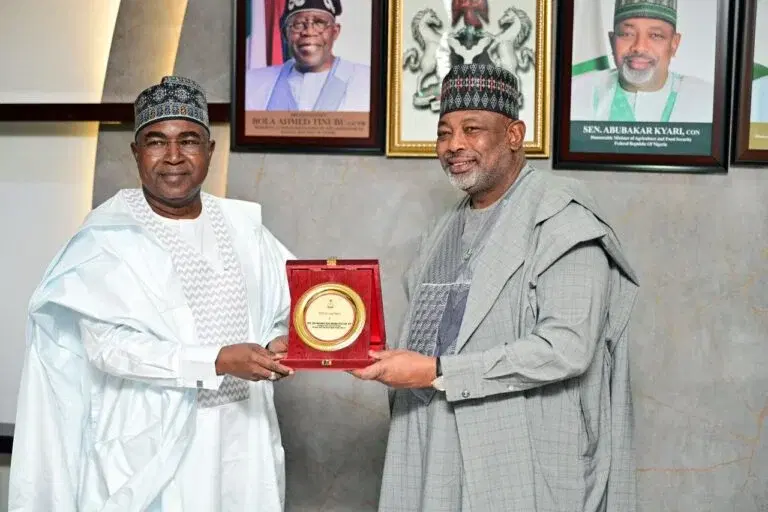Agric ministry partners NDLEA on drug control efforts

The Minister of Agriculture and Food Security, Sen. Abubakar Kyari has assured the National Drug Law Enforcement Agency (NDLEA) of the readiness of his ministry to support ongoing drug control efforts by the agency.
Kyari gave the assurance in his response to the remarks by the NDLEA Chairman, retired Brig.-Gen. Buba Marwa who led members of his management team in a meeting with the minister and top officials of the ministry in Abuja.
The minister said that the support would be in the areas of creating alternatives for illicit drug producers and provision of agricultural opportunities for drug users undergoing rehabilitation to prevent them from relapsing.
The Director, Media and Advocacy, NDLEA, Mr Femi Babafemi, made this known in a statement on Friday in Abuja.
According to the statement, Marwa had told the minister that the Renewed Hope Agenda of President Bola Tinubu has food security and national security as part of its focus, adding that tackling security needs adequate attention to drug control because they are interlinked.
Marwa said the visit was to seek collaboration between NDLEA and the ministry as part of ongoing efforts to surmount the challenge of drug scourge facing the country.
He noted that out of the 14.3 million drug users in Nigeria, 10.6 million of them abuse cannabis alone, making the psychoactive substance the most commonly abused in the country.
“As you know, cannabis is not only smoked, it is also eaten. They make soup with it. They mix it with hot drinks to produce monkey tail. They take it in all kinds of forms.
“Every week, we make arrests. And still, they keep at it, because there’s so much money in the business.
“And so, we sat down and reflected and felt that there’s a more permanent solution to this, especially with the growers of cannabis,” he said.
Marwa said that the agency had decided to create another platform called Alternative Development, which seeks to persuade cannabis growers to change from growing cannabis which was illicit to something legitimate and licit.
According to him, this will give them at least a legitimate source of income.
“Instead of always in fear of arrest by NDLEA, they will live respectable lives with their families and their communities.”
The NDLEA boss said that the project had secured the buy-in of the United Nations Commission on Narcotic Drugs and they are willing to encourage the Agency.
“But for us to tell cannabis growers, please, don’t grow cannabis, grow something else there has to be incentives for them to agree.
“I’ve actually had a meeting with some cannabis growers and discussed this idea with them. The fact that they agreed to come and meet me without the fear that they are being tricked so that we could arrest them, was a positive sign.
“We sat and had an engagement and I’ve also sent a delegation to their communities.
“This is where we need the support of the ministry to give them some inputs, seedlings, tractors, water, fertilizers, chemicals, and others,” he said.
Marwa said that the agency had looked at the possibility of getting them to grow food crops including artemisia annua plant that could fetch the country $100 billion annually.
He said that the plant was called sweet wormwood, adding that the derivative was used for the treatment of malaria.
“We consulted with IITA, they actually confirmed that they have grown samples across the country. They have done some trials and it seems to have a very positive outlook.
“With a $100 billion possible income to the country, if this is fully tapped, we’ll suggest that this is probably one of the areas of pharmaceutical crops that would be given to these cannabis growers to farm in addition to other licit crops,” he maintained.
The NDLEA chairman said the other area of collaboration was the assimilation of persons coming out of NDLEA rehab facilities into agricultural programmes and projects that would give them livelihood and prevent them from relapse.
“Now, when our children come to us for treatment and rehabilitation, because of drugs, we treat them, and they become normal people, responsible, after the treatment.
“Then you throw them back again into the same environment where they got into drug abuse, they will relapse.
“So, we thought that within the scheme of this esteemed ministry, if you can assist us so that at the end of their rehabilitation they can be assimilated into some of your agricultural programmes with whatever incentives go with them so that they can be gainfully engaged,” Marwa said.
The post Agric ministry partners NDLEA on drug control efforts appeared first on Vanguard News.

 yarkarkara
yarkarkara 





